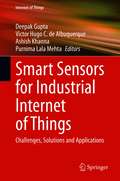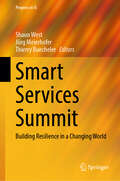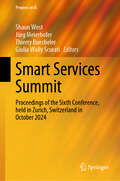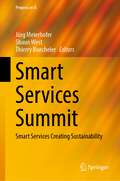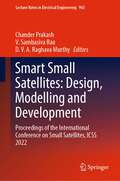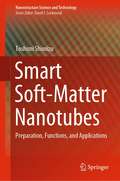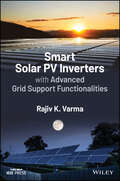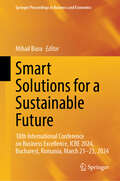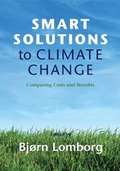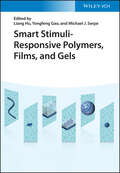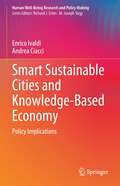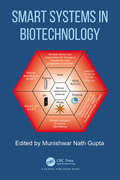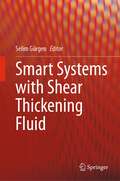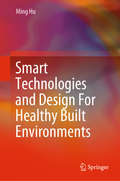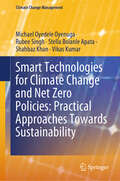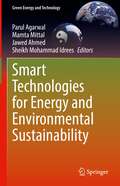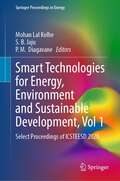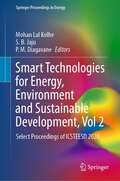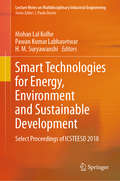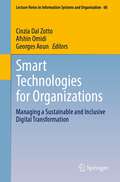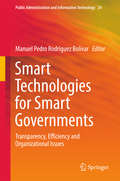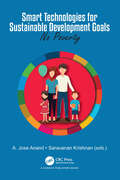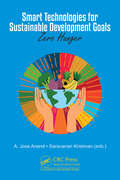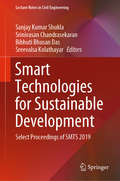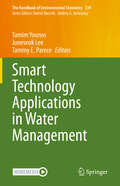- Table View
- List View
Smart Sensors for Industrial Internet of Things: Challenges, Solutions and Applications (Internet of Things)
by Deepak Gupta Ashish Khanna Victor Hugo C. de Albuquerque Purnima Lala MehtaThis book brings together the latest research in smart sensors technology and exposes the reader to myriad industrial applications that this technology has enabled. The book emphasizes several topics in the area of smart sensors in industrial real-world applications. The contributions in this book give a broader view on the usage of smart sensor devices covering a wide range of interdisciplinary areas like Intelligent Transport Systems, Healthcare, Agriculture, Drone communications and Security.By presenting an insight into Smart Sensors for Industrial IoT, this book directs the readers to explore the utility and advancement in smart sensors and their applications into numerous research fields. Lastly, the book aims to reach through a mass number of industry experts, researchers, scientists, engineers, and practitioners and help them guide and evolve to advance research practices.
Smart Services Summit: Building Resilience in a Changing World (Progress in IS)
by Shaun West Jürg Meierhofer Thierry BuechelerThis book presents up-to-date descriptions of Smart Services Innovations in industry, supported by new scientific approaches. It summarizes the outcomes of the fifth Smart Services Summit, held in Zurich in October 2023, which primarily focused on the ability of Smart Service Systems to support resilience and build sustainability. As the evolution of Smart Services accelerates, new technologies can be leveraged to create new value propositions and business models that deliver tangible sustainability outcomes. This book addresses social, economic, and environmental aspects of sustainability in connection with new technologies and includes papers on how these technologies can help achieve resilience and sustainability. In this context, topics such as sustainability and resilience in supply chains, X-as-a-Service, large language models for service automation, and location-based systems are discussed. Given its scope, the book represents an indispensable guide for practitioners and advanced students alike.
Smart Services Summit: Proceedings of the Sixth Conference, held in Zurich, Switzerland in October 2024 (Progress in IS)
by Shaun West Jürg Meierhofer Thierry Buecheler Giulia Wally ScuratiThis book presents up-to-date descriptions of smart service innovations in industry, supported by new scientific approaches. It summarizes the outcomes of the sixth Smart Services Summit, held in Zurich, Switzerland in October 2024, which primarily focused on digital co-creation in the smart services era and the transformative power of digital technologies and artificial intelligence in service ecosystems. The book explores the dynamics of value co-creation and examines how digital tools and artificial intelligence are enhancing interactions between service providers and consumers to innovate and improve service delivery. It covers a range of pertinent topics including the automation of customer engagement, the role of data analytics in understanding value perception, and the ethical considerations of AI in services. It also presents case studies that illustrate successful applications of AI in service design, offering readers a comprehensive view of how these technologies are fostering innovative co-creation practices. With contributions from leading academics and industry experts, this publication is essential for anyone interested in the future of service industries. It provides a scholarly yet accessible examination of how digital tools are not only reshaping service interactions but also establishing new paradigms for business and customer experiences in the digital age.
Smart Services Summit: Smart Services Creating Sustainability (Progress in IS)
by Shaun West Jürg Meierhofer Thierry BuechelerThis book presents up-to-date descriptions of smart services innovations in industry, supported by new scientific approaches. It summarizes the outcomes of the fourth Smart Services Summit, held in Zurich in October 2022, which primarily focused on how smart services can promote sustainability.As smart services accelerate, new technologies can be leveraged to create new value propositions and business models that deliver tangible sustainability outcomes. This book addresses social, economic and environmental aspects of sustainability in connection with new technologies. It includes contributions on how the quality and value of services are affected by digital technologies, how collaboration affects shared value creation, and how organizations can be enabled to drive digital value creation.Given its scope, the book represents an indispensable guide for practitioners and advanced students alike.
Smart Small Satellites: Proceedings of the International Conference on Small Satellites, ICSS 2022 (Lecture Notes in Electrical Engineering #963)
by Chander Prakash V. Sambasiva Rao D. V. A. Raghava MurthyThis book comprises the select proceedings of the International Conference on Small Satellites and its Applications (ICSS) 2022. It aims to provide a comprehensive and broad-spectrum picture of the state-of-the-art research, development, and commercial perspective of various discoveries conducted in the real-world smart small satellites, applications and their services. The contents of this book focuses on efficient power management system, application-based optimum payload designs, telemetry and telecommand, advanced navigation and RF systems, flight and ground software’s, structure, mechanism and materials, space craft autonomy, quality, testing and reliability for designing the small satellites through advanced computational procedures for a variety of applications, etc. This book proves a valuable resource for those in academia and industry.
Smart Soft-Matter Nanotubes: Preparation, Functions, and Applications (Nanostructure Science and Technology)
by Toshimi ShimizuThis book addresses the manufacturing methods, characteristic tubular morphologies, diverse functions, and potent applications of organic tubular architectures prepared or self-assembled from rationally designed molecular building blocks. The hollow cylindrical structures with high-aspect ratios are capable of creating unique functions that can be differentiated from well-known self-assembled nanostructures such as organic nanofibers, nanoribbons, and nanorods. Encapsulation, stabilization, transportation, release, and their cooperative functions pave the way for innovative chemical, physical, biological, and medical applications. The book presents attractive advantages of soft-matter nanotubes, which are also different from well-known hard-matter nanostructures such as carbon nanotubes. The topics and figures in this volume intrigue not only academic researchers but also engineers and university students.
Smart Solar PV Inverters with Advanced Grid Support Functionalities
by Rajiv K. VarmaLearn the fundamentals of smart photovoltaic (PV) inverter technology with this insightful one-stop resource Smart Solar PV Inverters with Advanced Grid Support Functionalities presents a comprehensive coverage of smart PV inverter technologies in alleviating grid integration challenges of solar PV systems and for additionally enhancing grid reliability. Accomplished author Rajiv Varma systematically integrates information from the wealth of knowledge on smart inverters available from EPRI, NREL, NERC, SIWG, EU-PVSEC, CIGRE, IEEE publications; and utility experiences worldwide. The book further presents a novel, author-developed and patented smart inverter technology for utilizing solar PV plants both in the night and day as a Flexible AC Transmission System (FACTS) Controller STATCOM, named PV-STATCOM. Replete with case studies, this book includes over 600 references and 280 illustrations. Smart Solar PV Inverters with Advanced Grid Support Functionalities’ features include: Concepts of active and reactive power control; description of different smart inverter functions, and modeling of smart PV inverter systems Distribution system applications of PV-STATCOM for dynamic voltage control, enhancing connectivity of solar PV and wind farms, and stabilization of critical motors Transmission system applications of PV-STATCOM for improving power transfer capacity, power oscillation damping (POD), suppression of subsynchronous oscillations, mitigation of fault induced delayed voltage recovery (FIDVR), and fast frequency response (FFR) with POD Hosting capacity for solar PV systems, its enhancement through effective settings of different smart inverter functions; and control coordination of smart PV inverters Emerging smart inverter grid support functions and their pioneering field demonstrations worldwide, including Canada, USA, UK, Chile, and India. Perfect for system planners and system operators, utility engineers, inverter manufacturers and solar farm developers, this book will prove to be an important resource for academics and graduate students involved in electrical power and renewable energy systems.
Smart Solutions for a Sustainable Future: 18th International Conference on Business Excellence, ICBE 2024, Bucharest, Romania, March 21–23, 2024 (Springer Proceedings in Business and Economics)
by Mihail BusuThis book presents a selection of the best papers from the 18th International Conference on Business Excellence, “Smart Solutions for a Sustainable Future” (ICBE 2024), held in Bucharest, Romania, in March 2024. In today's rapidly evolving landscape, characterized by volatility, uncertainty, complexity, and ambiguity (VUCA), the need to reshape business practices is of major importance. The book gathers research findings and perspectives on the new challenges in particularly in the field of digital economy and research systems. It focuses on the realignment of organizations and research systems offering valuable insights into the context of global crises and providing solutions to the real challenges we are facing today.
Smart Solutions to Climate Change: Comparing Costs and Benefits
by Bjørn LomborgThe failure of the Copenhagen climate conference in December 2009 revealed major flaws in the way the world's policy makers have attempted to prevent dangerous levels of increases in global temperatures. The expert authors in this specially commissioned collection focus on the likely costs and benefits of a very wide range of policy options, including geo-engineering, mitigation of CO2, methane and 'black carbon', expanding forest, research and development of low-carbon energy and encouraging green technology transfer. For each policy, authors outline all of the costs, benefits and likely outcomes, in fully referenced, clearly presented chapters accompanied by shorter, critical alternative perspectives. To further stimulate debate, a panel of economists, including three Nobel laureates, evaluate and rank the attractiveness of the policies. This authoritative and thought-provoking book will challenge readers to form their own conclusions about the best ways to respond to global warming.
Smart Stimuli-Responsive Polymers, Films, and Gels: Polymers, Films, And Gels
by Michael J. Serpe Liang Hu Yongfeng GaoSmart Stimuli-Responsive Poymers, Films, and Gels Discover the most important developments in synthesis, simulation, and applications of a fascinating compound class There exist a range of natural materials that respond to environmental changes by altering their physical or chemical properties, known as stimuli-responsive polymers, these substances are responsive to light, temperature, pressure, and more. The study of these so-called “smart” polymers is essential to a range of application fields, many of which have generated cutting-edge research in recent decades. A comprehensive introduction to the subject is therefore well-timed Smart Stimuli-Responsive Polymers, Films, and Gels provides an introduction to these polymers and their applications. It includes producing these polymers through synthetic approaches, simulating their responses to different stimuli, and applying these materials in different industries and research capacities. Written to serve the requirements of advanced students and senior researchers alike, this timely work will drive years of research in this vital field. In Smart Stimuli-Responsive Polymers, Films, and Gels readers will also find: Treatment of mechanoresponsive, photoresponsive, and ionizing-radiation responsive polymers Applications in emerging fields such as sensors, biomedicine, catalysis, and more Interdisciplinary research into the properties and responses of these vital compounds Smart Stimuli-Responsive Polymers, Films, and Gels promises to become a seminal work for chemists, materials scientists, and industrial researchers seeking to incorporate these materials into a variety of industrial and research areas.
Smart Sustainable Cities and Knowledge-Based Economy: Policy Implications (Human Well-Being Research and Policy Making)
by Enrico Ivaldi Andrea CiacciThis book provides information and resources to city planners and other public policy officials on the importance of smart sustainable cities and their relationship with urban knowledge-based economy. It answers important topical questions relating to urban sustainable development and human well-being, namely, how can we implement policies and programs that can make cities “smart” and boost their knowledge-based development? How can such programs reduce inequalities and enhance the environment where people live and work? The authors suggest a new approach to the creation of sustainable smart cities, not only in metropolises but also in smaller urban spaces. They advance the body of knowledge in entrepreneurship literature by examining both the European regional understanding of entrepreneurship and the quality of life and well-being at city levels. They also provide synthetic indexes to assess the relationship between perceived quality of life and entrepreneurship. This book stimulates the debate on the role of smart cities in promoting entrepreneurship, which is a currently under-investigated topic in Europe, and is of interest to a wide range of practitioners, professionals and academics in the area of well-being and quality of life research, urban studies, public policy, and sustainable development.
Smart Systems in Biotechnology
by Munishwar Nath GuptaThis compact volume is focused on an eclectic mix of biotechnological and biomedical applications of stimuli-sensitive polymeric materials. It starts with their chemical synthesis and design strategies. This is followed by discussions of their applications in microfluidics, biosensors, wound healing and anticancer therapy.Two other interesting applications covered are the design of aptamer-based smart surfaces for biological applications and use of smart hydrogels in tissue engineering.In general, it provides a snapshot of the current state-of-the-art in design and applications of smart systems at the interfaces of biological sciences.
Smart Systems with Shear Thickening Fluid
by Selim GürgenShear thickening fluid (STF) is a smart material that has been widely used in engineering applications over the last two decades. Its smart behavior, including adaptive viscosity, has found use in many engineering fields. This book provides an introduction to STF and smart systems, presenting cutting-edge technology and offering various case studies and research. It examines how conventional structures or systems can gain smart properties with the integration of STF, such as in magnetorheological materials, energy harvesting applications, battery electrolytes, vibration-damping systems, and surface polishing operations. Smart Systems with Shear Thickening Fluid is an essential resource for anyone working with STFs, and engineers, researchers, and scientists will gain valuable insights into its behavior and how it can be used to tailor rheology for smart applications.
Smart Technologies and Design For Healthy Built Environments (Springerbriefs In Applied Sciences And Technology Ser.)
by Ming HuSmart Technologies and Design for Healthy Built Environment connects smart technology to a healthy built environmentthat builds upon the sustainable building movement.It provides an overall summary of the state-of-the-art technologies that are applied in the built environment. The book covers a broad spectrum of smart technology categories ranging from dynamic operability, energy efficiency, self-regulating and self-learning systems, and responsive systems. The foreseeable challenges that are associated with smart technologies are discussed and outlined in the book. Firstly, this book provides a snapshot of state-of-the-art smart technologies being applied in the built environment. It covers a broad spectrum of smart technology categories, ranging from dynamic operability, energy efficiency, self-regulating and self-learning systems, to responsive systems. Secondly, this book provides in-depth analysis of the four primary components of health (biological, physical, physiological and psychological); their effects on wellbeing and cognitive performance are introduced as well. Thirdly, it connects smart technologies to those health-influencing factors by reviewing three completed smart building projects. This book can also serve as a basis for education and discussion among professionals and students of diverse backgrounds who are interested in smart technologies, smart building, and healthy building. Smart Technologies and Design for Healthy Built Environment serves as the basis for education and discussions among professionals and students who are interested in smart technologies, smart building and healthy building, as it bridges the gap between smart technologies and a healthy built environment. The book also provides a foundation for anyone who is interested in the impact of smart technology on the health of built environment.
Smart Technologies for Climate Change and Net Zero Policies: Practical Approaches Towards Sustainability (Climate Change Management)
by Vikas Kumar Shahbaz Khan Rubee Singh Michael Oyedele Oyenuga Stella Bolanle ApataThis book provides a detailed overview of the causes, effects, and solutions to climate change as well as net zero policies in order to harness emerging technologies in order to address global warming and adopt sustainable practices for future generations without damaging the resources of today. It also offers various practical solutions and approaches for addressing global warming and the impact of net zero emissions across a range of sectors in addressing climate change and addressing global warming. The urgency to combat climate change has led to the emergence of innovative technologies that support net-zero policies and sustainability initiatives. This book examines how digital transformation and technological advancements are reshaping industries, governance, and environmental strategies to achieve a carbon-neutral future. This book provides an in-depth exploration of key technologies such as artificial intelligence, machine learning, blockchain, the Internet of Things (IoT), and big data analytics, demonstrating their role in optimizing energy efficiency, reducing carbon footprints, and enhancing environmental monitoring. It also discusses breakthroughs in green hydrogen, battery storage, carbon capture and storage (CCS), and bioengineering, showcasing how these solutions contribute to net-zero ambitions. A key highlight of this book is its focus on use of sustainable technological solutions for various sectors for climate change and net zero economy. From renewable energy breakthroughs to digital innovations such as IoT-based climate monitoring and blockchain-enabled emissions tracking, this section unpacks how technology can drive sustainability at scale. Case studies of successful implementations across different continents illustrate the transformative power of innovation in energy, urban planning, and industrial processes. Focusing on practical applications, the book covers various sectors, including manufacturing, transportation, agriculture, and urban planning. It illustrates how digital twin technology, smart grids, and precision farming can drive sustainability while fostering economic growth.
Smart Technologies for Energy and Environmental Sustainability (Green Energy and Technology)
by Mamta Mittal Sheikh Mohammad Idrees Parul Agarwal Jawed AhmedAs the application of smart technologies for monitoring environmental activities becomes more widespread, there is a growing demand for solutions that can help analyze the risk factors and impacts on the environment by focusing on energy consumption, storage, and management. This book is designed to serve as a knowledge-sharing platform, focusing on the emerging models, architectures, and algorithms being developed for smart computational technologies that can lead to efficient energy conservation and environmental sustainability.
Smart Technologies for Energy, Environment and Sustainable Development, Vol 1: Select Proceedings of ICSTEESD 2020 (Springer Proceedings in Energy)
by Mohan Lal Kolhe S. B. Jaju P. M. DiagavaneThis book contains select proceedings of the International Conference on Smart Technologies for Energy, Environment, and Sustainable Development (ICSTEESD 2020). The book is broadly divided into the themes of energy, environment, and sustainable development; and discusses the significance and solicitations of intelligent technologies in the domain of energy and environmental systems engineering. Topics covered in this book include sustainable energy systems including renewable technologies, energy efficiency, techno-economics of energy system and policies, integrated energy system planning, environmental management, energy efficient buildings and communities, sustainable transportation, smart manufacturing processes, etc. The book will be a valuable reference for young researchers, professionals, and policy makers working in the areas of energy, environment and sustainable development.
Smart Technologies for Energy, Environment and Sustainable Development, Vol 2: Select Proceedings of ICSTEESD 2020 (Springer Proceedings in Energy)
by Mohan Lal Kolhe S. B. Jaju P. M. DiagavaneThis book contains select proceedings of the International Conference on Smart Technologies for Energy, Environment, and Sustainable Development (ICSTEESD 2020). The book is broadly divided into the themes of energy, environment, and sustainable development; and discusses the significance and solicitations of intelligent technologies in the domain of energy and environmental systems engineering. Topics covered in this book include sustainable energy systems including renewable technologies, energy efficiency, techno-economics of energy system and policies, integrated energy system planning, environmental management, energy efficient buildings and communities, sustainable transportation, smart manufacturing processes, etc. The book will be a valuable reference for young researchers, professionals, and policy makers working in the areas of energy, environment and sustainable development.
Smart Technologies for Energy, Environment and Sustainable Development: Select Proceedings of ICSTEESD 2018 (Lecture Notes on Multidisciplinary Industrial Engineering)
by Mohan Lal Kolhe Pawan Kumar Labhasetwar H. M. SuryawanshiThis book comprises select proceedings of the International Conference on Smart Technologies for Energy, Environment, and Sustainable Development (ICSTEESD 2018). The chapters are broadly divided into three focus areas, viz. energy, environment, and sustainable development, and discusses the relevance and applications of smart technologies in these fields. A wide variety of topics such as renewable energy, energy conservation and management, energy policy and planning, environmental management, marine environment, green building, smart cities, smart transportation are covered in this book. Researchers and professionals from varied engineering backgrounds contribute chapters with an aim to provide economically viable solutions to sustainable development challenges. The book will prove useful for academics, professionals, and policy makers interested in sustainable development.
Smart Technologies for Organizations: Managing a Sustainable and Inclusive Digital Transformation (Lecture Notes in Information Systems and Organisation #60)
by Cinzia Dal Zotto Afshin Omidi Georges AounThis book contains high-profile contributions that emerged from the Information and Communication Technologies in Organizations and Society (ICTO) conference on "Smart Technologies for an Inclusive World," held in 2020. It focuses on the interplay between technology adoption, digital transformation, and value creation, highlighting various aspects of current issues organizations face in adopting digital technologies to achieve an inclusive and sustainable society in the long term. As such, the book contributes to our understanding of a humanistic approach to managing digital transformation toward inclusive organizations and societies and is a valuable asset for both researchers and managers of organizations.
Smart Technologies for Smart Governments
by Manuel Pedro Rodríguez BolívarThis book examines the introduction of smart technologies into public administrations and the organizational issues caused by these implementations, and the potential of information and communication technologies (ICTs) to rationalize and improve government, transform governance and organizational issues, and address economic, social, and environmental challenges. Cities are increasingly using new technologies in the delivery of public sector services and in the improvement of government transparency, business-led urban development, and urban sustainability. The book will examine specific smart projects that cities are embracing to improve transparency, efficiency, sustainability, mobility, and whether all cities are prepared to implement smart technologies and the incentives for promoting implementation. This focus on the smart technologies applied to public sector entities will be of interest to academics, researchers, policy-makers, public managers, international organizations and technical experts involved in and responsible for the governance, development and design of Smart Cities.
Smart Technologies for Sustainable Development Goals: No Poverty
by Saravanan Krishnan A. Jose AnandSustainable Development Goals or SDGs refer to the UN stipulated road-map for development in 17 defined areas, by 2030. It was built on the previously established Millennium Development Goals (MDG). This first volume (SDG-1) deals with eradicating poverty with the help of modern ICT technologies needed to end poverty and create a better society. This much needed book, which is the first of its type to offer a specific focus on the relationship between technology and the SDG-1 goal, will be valuable for all working in the subject of global sustainable development. Global organisations and representatives of governments targeting no poverty share knowledge on these ICT practices to eradicate poverty in all means.
Smart Technologies for Sustainable Development Goals: Zero Hunger
by Saravanan Krishnan A. Jose AnandSustainable Development Goals (SDGs) give the UN a road-map for development, with Agenda 2030 as the target. It was built on the previously established Millennium Development Goals (MDGs). This book examines the supporting technologies needed to achieve SDG 2: reducing hunger and creating a better society. This much-needed book, the first of its type to offer a specific focus on the relationship between technology and SDG 2, will be valuable for academics working in the subject of global sustainable development. This book will also be useful for international organisations and representatives, who will be able to share knowledge on technological views to minimise hunger rates.
Smart Technologies for Sustainable Development: Select Proceedings of SMTS 2019 (Lecture Notes in Civil Engineering #78)
by Srinivasan Chandrasekaran Sanjay Kumar Shukla Sreevalsa Kolathayar Bibhuti Bhusan DasThis book presents select papers from the International Conference on Smart Materials and Techniques for Sustainable Development (SMTS) 2019. The contents focus on a wide range of methods and techniques related to sustainable development fields like smart structures and materials, innovation in water resource development, optical fiber communication, green construction materials, optimization and innovation in structural design, structural dynamics and earthquake engineering, structural health monitoring, nanomaterials, nanotechnology and sensors, smart biomaterials and medical devices, materials for energy conversion and storage devices, and IoT in sustainable development. This book aims to provide up-to-date and authoritative knowledge from both industrial and academic worlds, sharing best practice in the field of smart materials analysis. The contents of this book will be beneficial to students, researchers, and professionals working in the field of smart materials and sustainable development.
Smart Technology Applications in Water Management (The Handbook of Environmental Chemistry #139)
by Tamim Younos Tammy E. Parece Juneseok LeeThis book reviews the latest advances and practical applications of smart technologies applied to water resource management. Bridging environmental chemistry, engineering, and information technology, the book offers a multidisciplinary perspective on how digital innovations are reshaping water monitoring, infrastructure diagnostics, and decision-making processes. Chapters by expert contributors cover topics such as the applications of machine learning for drinking water pipeline replacement, geospatial technologies, satellite and remote sensing technologies, Internet - of - Things (IOT), cybersecurity, robotics in water monitoring and artificial intelligence. Particular attention is given to the applications in real-time modelling of flood forecasting in urban drainage systems and the implementation of smart water networks. With detailed case studies and industry insights, this book highlights practical implementations such as smart water networks, optimal sensor deployment, and AI-driven service line material detection. Given its breadth, the book is a valuable resource for researchers, scholars and students, and serves as a roadmap for water resource engineers and planners tackling water security and diverse water resources portfolios.
